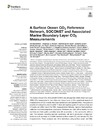Please use this identifier to cite or link to this item:
https://accedacris.ulpgc.es/jspui/handle/10553/58392
| Title: | A Surface Ocean CO2 Reference Network, SOCONET and Associated Marine Boundary Layer CO2 Measurements | Authors: | Wanninkhof, Rik Pickers, Penelope A. Omar, Abdirahman M. Sutton, Adrienne Murata, Akihiko Olsen, Are Stephens, Britton B. Tilbrook, Bronte Munro, David Pierrot, Denis Rehder, Gregor Magdalena Santana-Casiano, J. Mueller, Jens D. Trinanes, Joaquin Tedesco, Kathy O'Brien, Kevin Currie, Kim Barberols, Leticia Telszewski, Maciej Hoppema, Mario Ishii, Masao Gonzalez-Davila, Melchor Bates, Nicholas R. Metzl, Nicolas Suntharalingam, Parvadha Feely, Richard A. Nakaoka, Shin-ichiro Lauvset, Siv K. Takahashi, Taro Steinhoff, Tobias Schuster, Ute |
UNESCO Clasification: | 251002 Oceanografía química | Keywords: | Carbon dioxide Network Oceanography Fluxes Best practices |
Issue Date: | 2019 | Project: | Optimizing And Enhancing The Integrated Atlantic Ocean Observing System (Atlantos) Readiness Of Icos For Necessities Of Integrated Global Observations- Ringo |
Journal: | Frontiers in Marine Science | Abstract: | The Surface Ocean CO2 NETwork (SOCONET) and atmospheric Marine Boundary Layer (MBL) CO2 measurements from ships and buoys focus on the operational aspects of measurements of CO2 in both the ocean surface and atmospheric MBLs. The goal is to provide accurate pCO(2) data to within 2 micro atmosphere (mu atm) for surface ocean and 0.2 parts per million (ppm) for MBL measurements following rigorous best practices, calibration and intercomparison procedures. Platforms and data will be tracked in near real-time and final quality-controlled data will be provided to the community within a year. The network, involving partners worldwide, will aid in production of important products such as maps of monthly resolved surface ocean CO2 and air-sea CO2 flux measurements. These products and other derivatives using surface ocean and MBL CO2 data, such as surface ocean pH maps and MBL CO2 maps, will be of high value for policy assessments and socio-economic decisions regarding the role of the ocean in sequestering anthropogenic CO2 and how this uptake is impacting ocean health by ocean acidification. SOCONET has an open ocean emphasis but will work with regional (coastal) networks. It will liaise with intergovernmental science organizations such as Global Atmosphere Watch (GAW), and the joint committee for and ocean and marine meteorology (JCOMM). Here we describe the details of this emerging network and its proposed operations and practices. | URI: | https://accedacris.ulpgc.es/handle/10553/58392 | ISSN: | 2296-7745 | DOI: | 10.3389/fmars.2019.00400 | Source: | Frontiers In Marine Science [ISSN 2296-7745], v. 6, 400 |
| Appears in Collections: | Reseña |
SCOPUSTM
Citations
34
checked on Jun 8, 2025
WEB OF SCIENCETM
Citations
34
checked on Feb 22, 2026
Page view(s)
83
checked on Jan 10, 2026
Download(s)
94
checked on Jan 10, 2026
Google ScholarTM
Check
Altmetric
Share
Export metadata
Items in accedaCRIS are protected by copyright, with all rights reserved, unless otherwise indicated.
